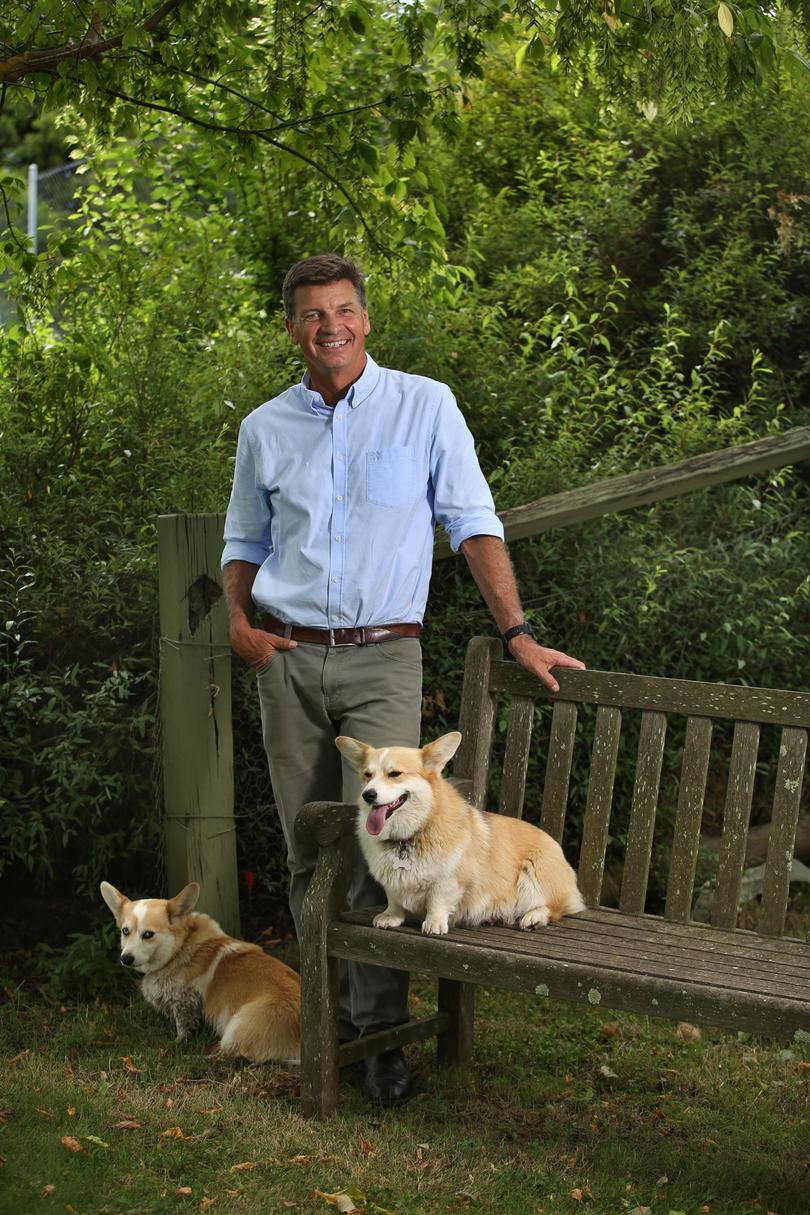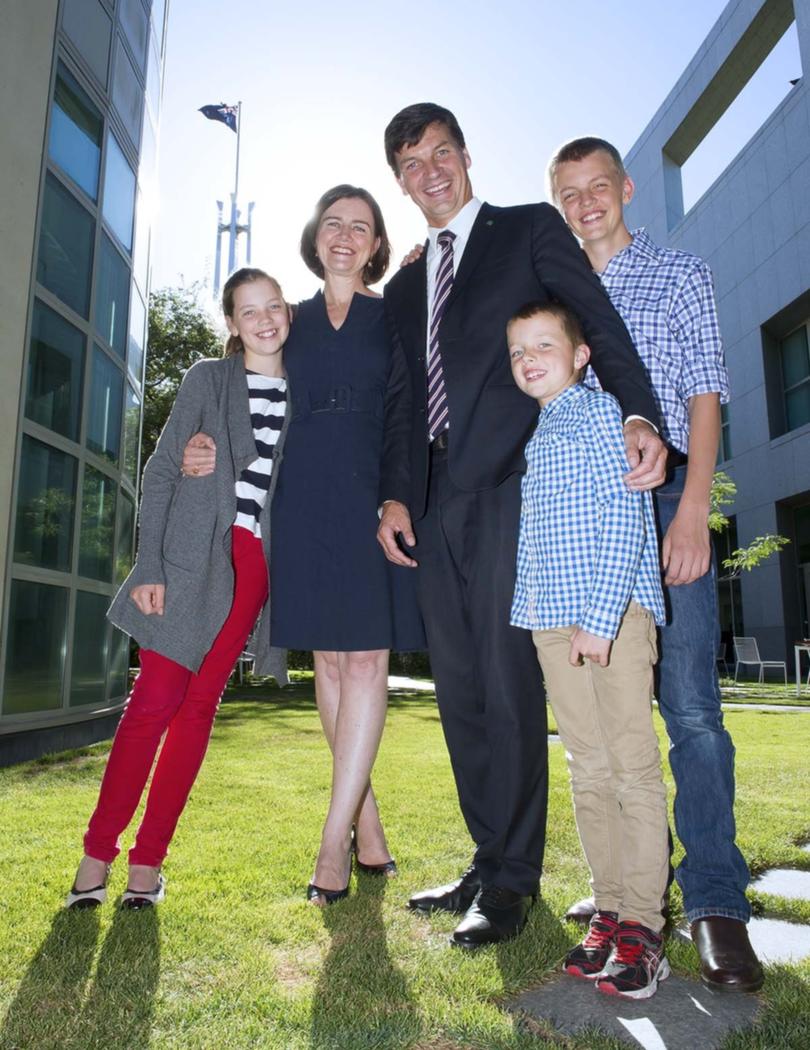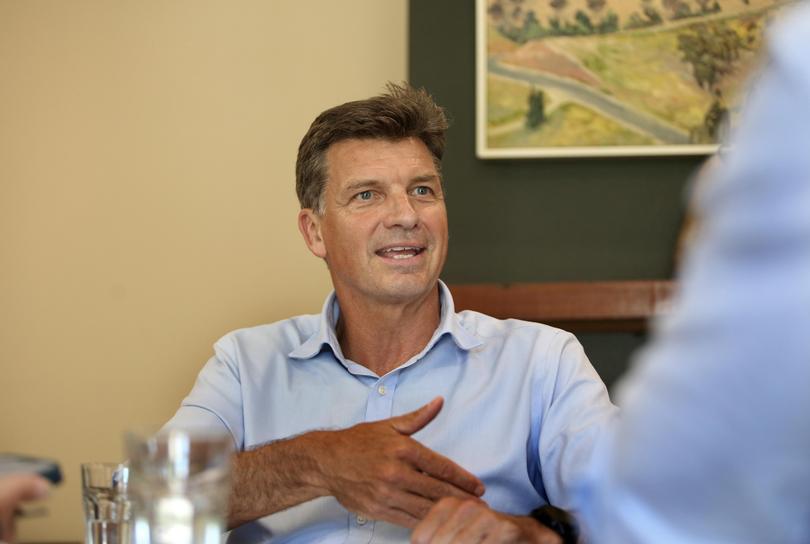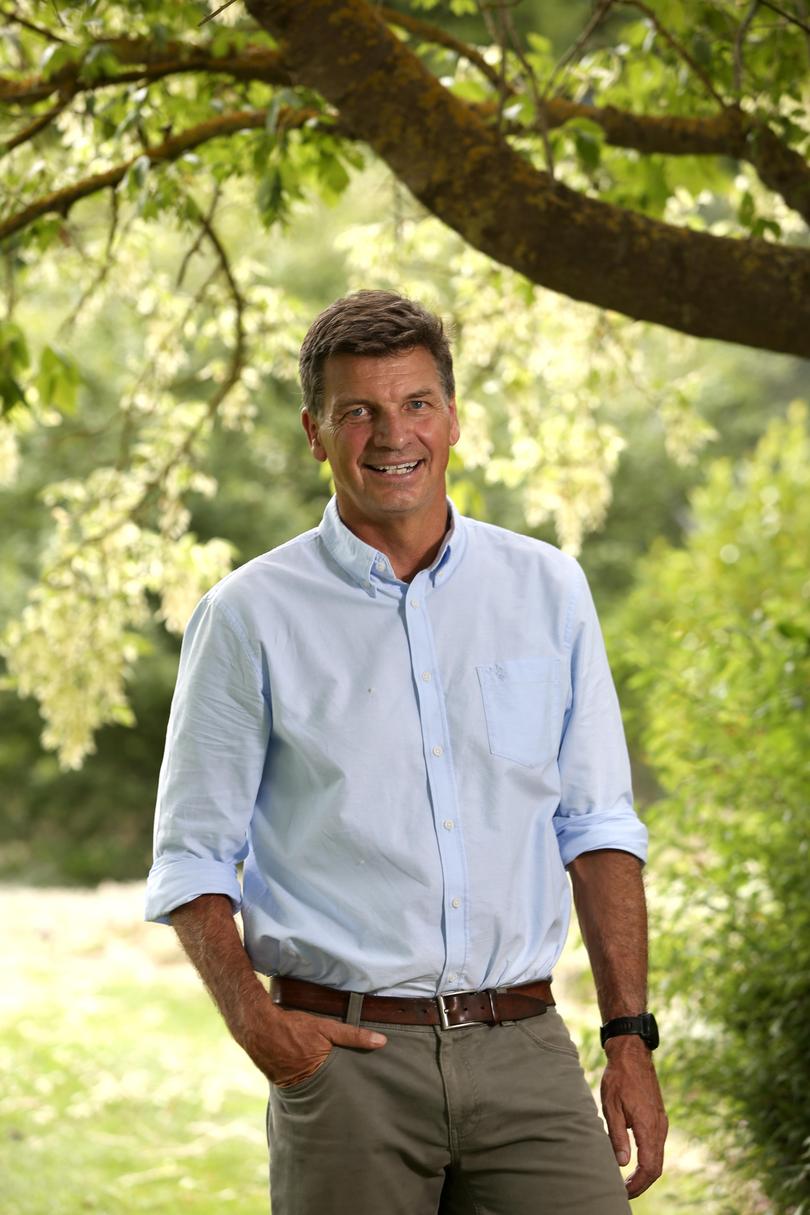Angus Taylor interview: How Member for Hume plans to set things right if Coalition wins election
In a wide-ranging conversation with The Nightly before the 2025 election, Angus Taylor revealed how his farm upbringing and Paul Keating’s recession helped forge his own economic blueprint.
The long, dusty driveway to Angus Taylor’s Goulburn farmhouse winds through grassy fields, offering sweeping views of the Southern Tablelands’ patchwork of forests and farmland.
Visitors are greeted by Frankie and Violet, affable Corgis who lead the way to a rustic wooden table on a leafy veranda.
It’s an idyllic spot that represents the typical rural Australian dream. So what possessed the shadow treasurer — a successful financial services consultant with substantial personal wealth — to enter the merciless world of politics?
Sign up to The Nightly's newsletters.
Get the first look at the digital newspaper, curated daily stories and breaking headlines delivered to your inbox.
By continuing you agree to our Terms and Privacy Policy.The Nightly travelled to the property near Goulburn, New South Wales, to interview the man who may control the nation’s purse strings if the Coalition is launched to power in the next Federal election.
In a wide-ranging conversation, Mr Taylor revealed his economic vision and the values that would guide him in one of the most powerful offices in the land.
He reasoned why Australia will eventually accept nuclear power, offered insights on debt, the housing crisis, productivity challenges and immigration, and promised the Coalition would always put Australia’s interests first on the world stage — even if it meant taking the risky step of standing up to US President Donald Trump.
Lessons from life on a farm
The son of a fourth-generation sheep farmer who grew up on the chilled slopes of the Monaro high country, Mr Taylor is shaped by the boom and bust cycle of the wool business.
Now 58, Taylor recalls a youth spent around the kitchen table, where wool prices, and politics were the order of the day.

“Anyone who grew up on a farm was shaped by it, because it’s a small business. You work hard, family and business are the same thing, and you learn hard lessons about the realities of life,” he said.
The bust years, which overlapped Paul Keating’s “recession we had to have”, were especially formative. Mr Taylor tells of neighbours shooting sheep during a drought-driven collapse of the wool price.
“My mother died at the same time, so it was a really formative time for me … the combination of the economic struggles and the family struggles,” he said.
“I think it’s why economics and politics were always of interest to me, because I saw very directly how that affects people’s lives.”
The experience deepened the natural aversion most farmers have towards government intervention and moulded his attitude to debt, one that informs his policy of fiscal guardrails on government spending.
“I’m not averse to debt per se, but debt without purpose can be dangerous in business, and it can be in government too,” he explained.
“Growing up in that environment, every dollar is valuable. Every dollar you spend that you don’t have to is a wasted dollar.”
Given his upbringing, perhaps it is no surprise that Mr Taylor’s favourite show is Yellowstone, a series about a Montana ranching dynasty, coincidentally named Dutton, standing up for their landholder rights in the face of government overreach and woke progressive incursion.
Global footsteps
The great plains of the MidWest are a long way from the Gothic spires of Oxford, which Mr Taylor attended as a Rhodes Scholar after completing an economics/law degree at the University of Sydney. It put him in the footsteps of other former political leaders such as Bob Hawke, Tony Abbott and Malcolm Turnbull.
The kid from Cooma struck up a friendship with a like-minded American from Oklahoma, “very Hillbilly Elegy”, he says, referring to the rags to riches tale of US Vice President JD Vance. “He grew up in a very, very tough family, tough environment, managed with the support of his grandmother, get through school, go to Harvard and ended up at Oxford.
“I kind of thought, ‘yeah, this is, this is transformative’,” he said.
“The transformation of people’s lives is an incredible thing to see. I’ve seen it in my electorate. I’ve seen it in business. I saw it at Oxford, and I’ve always revered that. I think it’s something that we as Australians should celebrate when we see it as well.
Standing up to Trump
Entering the treasurer’s office would thrust Mr Taylor from the skirmishes of parliamentary Question Time onto the stage of an increasingly bipolar world.
Is he up to the major league challenge of steering Australia through the turbulent competition between the US and China?
“We’ve dealt with this before,” he said, harking back to the wool industry’s trade with Russia and China before the fall of the Berlin Wall.
“The industry was able to manage that balance between the strategic and the geopolitical and the economic,” he said.
But the Cold War era was a different, more predictable, beast compared to the uncertainty of fractious ties between economic superpowers, the US and China, and an American President who loves to shoot from the hip and retaliate against anyone, even allies, who try to cross him.

A Coalition government would be willing to stand up to US President Donald Trump on tariffs if it had to, asserted Mr Taylor.
“We should stand up to anyone who is going to get in the way of the prosperity of our country,” he said.
“As a country we have always benefited from free trade, and it’s a good thing for this country, and always has been, and we should be champions of trade,” he argued.
“We, as a government, stood up to him (Trump) last time around. And the test for this government right now is, will they stand up to that again and stand up for free trade, most importantly.”
It’s a daring promise that could brush against the more cautious strategy of Opposition Leader Peter Dutton who has long been dubbed “Trump-lite” and who has carefully stayed below the radar in his comments on the tariffs question.
The Coalition would have a “very close working relationship” with the Trump 47 Administration and cultivate “very constructive” ties with China, Mr Dutton said in late January.
Small government
While they may have forged a bond in the conservative crucible that was the so-called “monkey pod” room of the Abbott and Dutton resistance to Malcolm Turnbull, Mr Taylor and Mr Dutton’s backgrounds are worlds apart.
Taylor, the blue-blooded son of a farming dynasty with the blue-chip education has little in common with Peter Dutton’s hardscrabble upbringing.
His long history consulting to corporations and deep connection to the country’s executive class will be downplayed in this election.
Peter Dutton’s pitch to the tradies and small businesses of the country — or “Howard’s battlers” as they were once known — is to play down its ties to big business.
“I think the Liberal Party, if we look back over the last 20 or 30 years, drifted too close to big business,” Mr Dutton told the Mark Bouris podcast. “Really our party is for small business … the people in outer suburbs and working class people who have seen the Liberal Party as just for the big end of town.”
The party wants to tap into Australia’s entrepreneurial spirit, which accords with Mr Taylor’s philosophy of government getting out of the way.

“Personal responsibility, and personal aspiration is a powerful force, and I think we have to unleash that more than anything, you’re never going to subsidise your way to a successful business,” he said.
Mr Taylor is highly critical of Labor’s cost-of-living handouts.
“Labor’s view is … big government is the answer. Big government’s never been the answer to an inflationary, higher interest rate environment. It never was, and it never will be,” he said.
But the Coalition’s recent proposal to subsidise small business hospitality to the tune of $20,000 per business, per year has been leapt on by Labor as hypocritical, who claim it will blow a $1.6 billion hole in the budget.
Mr Taylor refused to be drawn on the ideological disconnect instead saying the Coalition was dedicated to “freeing up small business from an enormous amount of red tape, which they have in fringe benefits tax”.
“We’re focused on small business in particular for accelerated depreciation, for fringe benefits tax. I think these are important down payments that frees up business to get out there investing and do what it knows how to do best.” he said.
The business of government
Catapulted into cabinet in his first term after Malcolm Turnbull deposed Tony Abbott in 2016, Mr Taylor immediately impressed with his aptitude and work ethic.
His 20 years of pre-parliamentary experience working for McKinsey and later Port Jackson Partners was applied to the mammoth task in digitising government departments.
He was up to the challenge, having previously convinced the warring factions of New Zealand’s farm associations to merge to form the global dairy behemoth Fonterra.
“(It) created a company which is a global powerhouse, led by a bunch of farmers who were incredibly commercial, smart and cared deeply. And that’s exciting.”
But can a consultant’s mindset convert to the meat grinder of the national budget, where commercial practicalities are often absent, and horse trading abounds? Mr Taylor thinks it can.
“You’ve got to have those disciplines, which means everyone in their team, in our case, the cabinet and the bureaucracy understands these are the rules. If everyone understands the rules, then you’ve got a good chance of keeping them.”
Taylor’s approach to running the Treasury, and the country, is similarly informed by his business background.
“You’ve got to be constantly evolving to survive and prosper. For a lot of industries, it’s grow or go. You learn that in farming — it’s hard to be standing still. You’ve got to be continually evolving, but sensible in a conservative way, because radical change can be really high risk.”
Energy and environment
Where the Coalition has made a radical choice, is with an ambitious nuclear policy that would see seven reactors built on the sites of coal power plants.
At a cost of more than $300 billion and a timeline of at least 12 years before the first site is up and running, the Coalition has been criticised for making a big bet on a technology that has been plagued with cost overruns globally, and one that commits the country to a state-supported 40-year power offtake agreement.
While Labor has decried the policy as a “fantasy” Mr Taylor believes it is the only way to deal with the country’s energy deadlock.
“There’s been so much intervention, particularly by state governments, over the years. The idea that this is working as a free market is not right,” he explained.
You’ve got to make approvals work. You’ve got to get industrial relations right. You’ve got to get your energy sector right.
“Sadly, that’s where we’re at. So we deal in the world as it is, not as we’d like it to be. The result is, we’ve now, we need now dealing with a crisis. We’ll see manufacturing leave this country if we don’t fix that problem fast. We’ve got to fix it.”
While the Coalition has a nuclear horse in the energy race, Mr Taylor is otherwise against the idea of the State picking winners.
He reaffirmed the Coalition’s opposition to Labor’s Future Made in Australia policy, saying Australia’s comparative advantages lay in agriculture and resources, and “new service sectors in technology”.
The goal is getting the settings right, he said.
“You’ve got to make approvals work. You’ve got to get industrial relations right. You’ve got to get your energy sector right. I learned working in the resources sector, if you get those things right, companies will invest.”
Housing
On other policies so far, the Coalition is adopting a small target strategy and is short on costing specifics, leaving itself vulnerable to Labor’s attack of lacking substance over its cost-of-living promises.
Not so, countered Mr Taylor, who asserts the Coalition has a “toolkit for the times to deal with inflationary pressures” and an attractive offering on the critical issue of housing shortages.

As the father of four children in their late teens to early twenties, he believes the cost of living is “bearing down on that generation very hard,” with housing unavailability at the centre of the question of whether they will be as well off as their parents.
He sidestepped a question about whether housing prices should come down.
“There’s many levers to affordability. The first lever is lower interest rates. The second is rising real incomes and rising real wages,” he said.
The Coalition has promised to unlock up to 500,000 new homes by investing $5 billion to fund essential infrastructure like water, power and sewerage facilities.
But its solution to cut migration to fix housing supply problems has been labelled short-sighted by experts, who say this strategy would make housing a bit cheaper but ultimately make Australia’s economy poorer through the loss of skilled migrants’ taxes.
Modelling published last year by Brendan Coates, Housing and Economic Security Program Director at the Grattan Institute, calculated that slashing permanent migration from 185,000 to 160,000 in the long term could cost future governments up to $211b in today’s dollars.
But Mr Taylor rejects any suggestion of populism.
“If your immigration is growing at double the rate of your housing capacity, then you’re going to have housing shortages,” he said.
Skilled migrants make an “amazing contribution,” but there’s a balance, he argued. “You can only handle so many a year or you start putting critical things out of reach of people.”
Political vision
A devotee of post war leaders like De Gaulle, Churchill and Menzies, Taylor will need to draw on all of his oratory potential in what will be a bruising electoral campaign.
But there is scepticism in the Labor camp about his potential to be a heavy hitter, with a prevailing view that he is not as worthy as foe as Opposition Leader Peter Dutton or frontbench colleagues David Coleman and James Paterson.
In this cost of living election, Labor is willing to pit their master communicator in Jim Chalmers against Taylor’s stiff public exterior.
In person, however, he is warm and convivial, and a committed family man who counts his wife as one of his inspirations.
Having spent decades at a consulting firm where the philosophy is “up or out”’, this may be Taylor’s best chance to reach the heights of his political heroes, and his aspirations for the country.
“An Australia where everyone can be their best, can aspire to own a home, and raise a family.”
Family is Mr Taylor’s bedrock. His cites his wife, barrister Louise Clegg, as an “inspiration” and spending time with his four children something he relishes coming home to.
“I come from a farming family where a loving family really enables so much in life, and that’s what I believe in deeply.
“I haven’t always lived that as much as I would like to being a politician because I’m away a lot, but I do think those relationships at the end count more than anything else, and that’s at the heart of who I am and what I believe in.”
